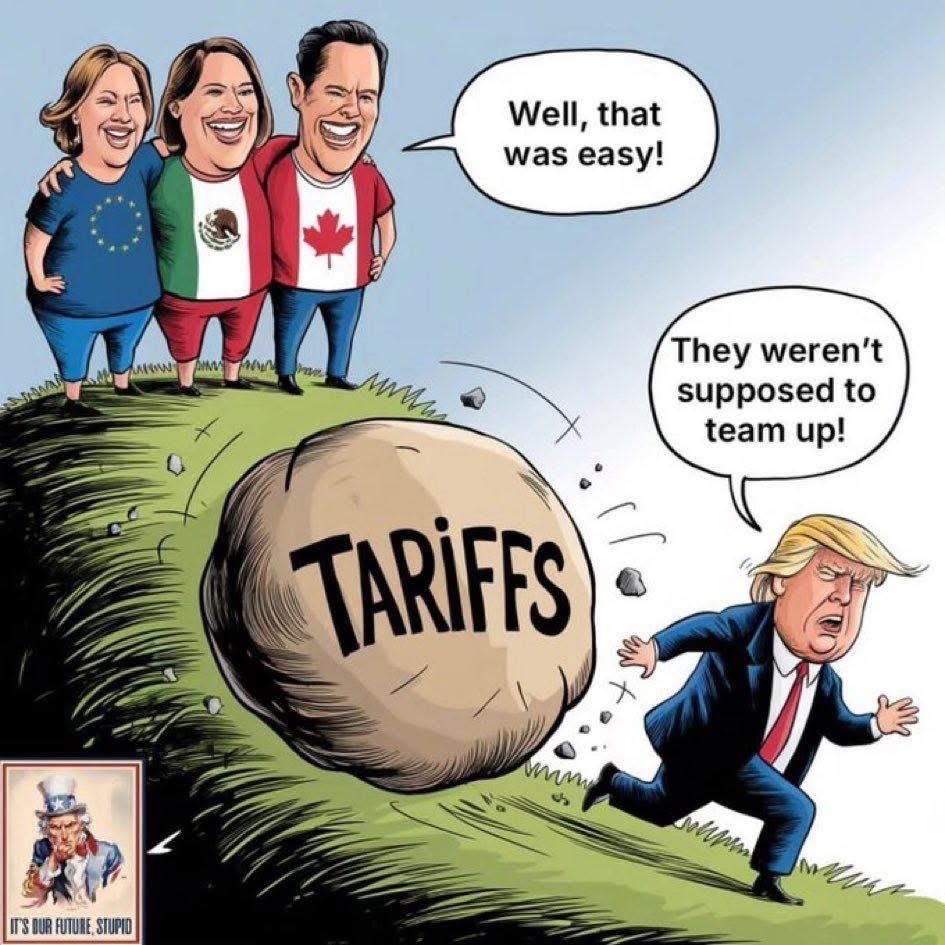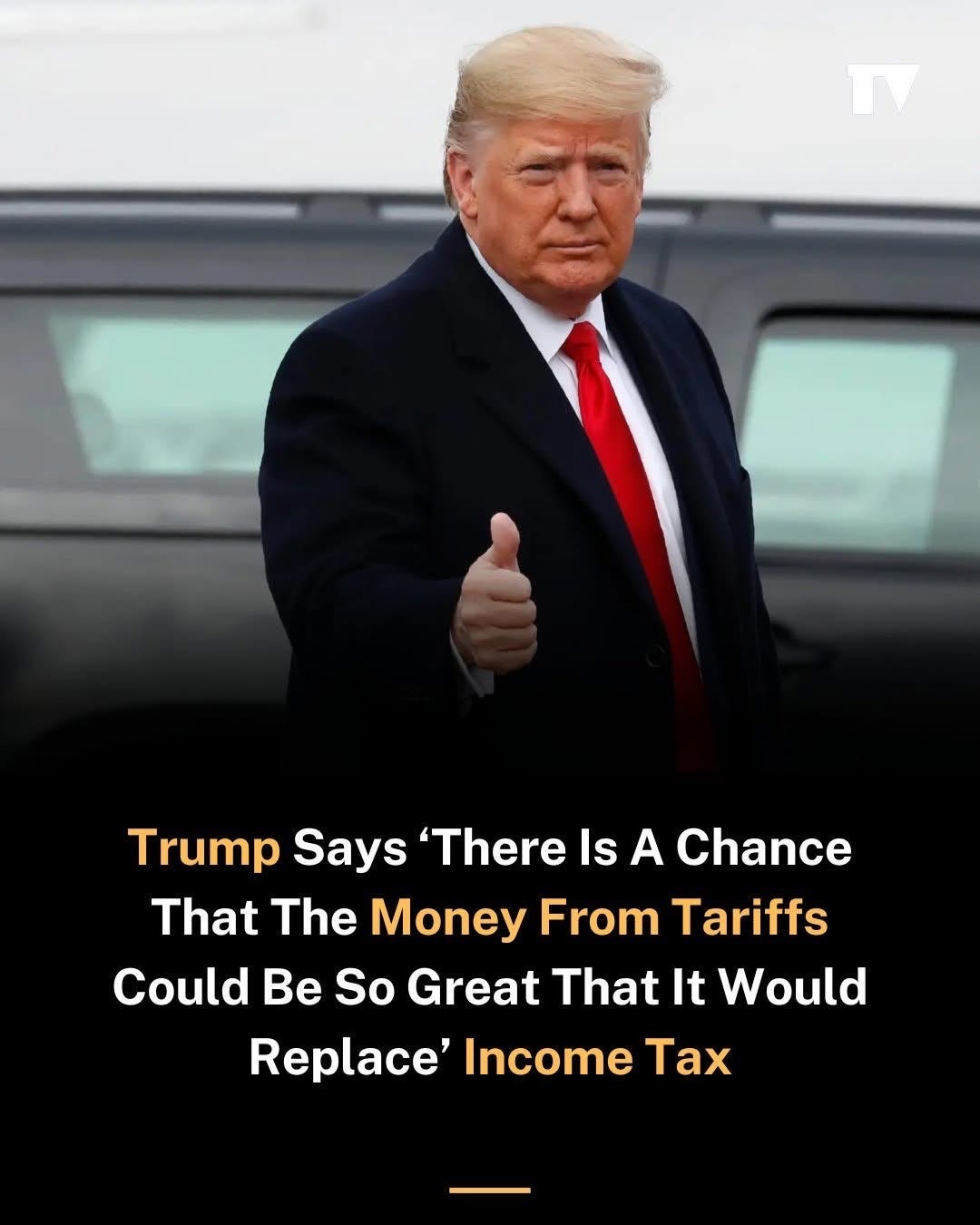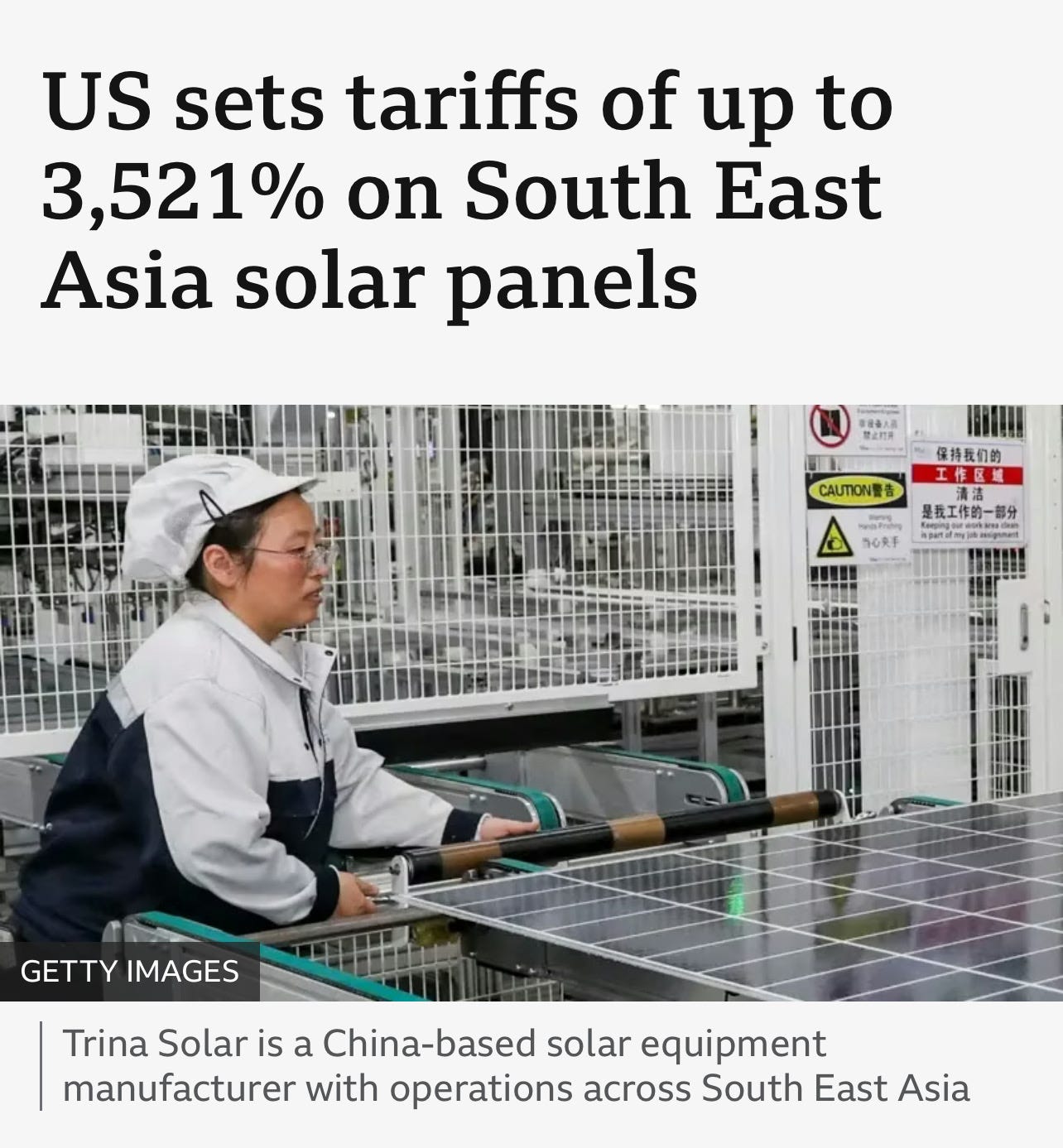Tariffs will hurt US citizens by raising the prices of imported goods, potentially leading to inflation and higher costs of living for consumers.
For all clueless MAGA MORONS:
In an interview with Fox News on April 15, 2025, President Donald Trump suggested that tariffs could potentially replace the income tax, citing historical periods when tariffs were the primary revenue source for the U.S. government.
He mentioned that tariffs are generating billions daily and could fund the government, while also noting a 90-day pause on some tariffs and ongoing trade negotiations with foreign nations to reduce the U.S. trade deficit.
The proposal has sparked concerns about economic impacts, including market volatility and potential recession risks.
While the idea of replacing income tax with tariffs might sound appealing at first glance, it’s actually a regressive approach that would disproportionately hurt low-income earners.
Tariffs raise the cost of everyday goods – clothing, electronics, food – and these rising prices hit those hardest who already spend most of their income on basic needs. Unlike income tax, which is progressive and based on what you earn, tariffs act as a flat consumption tax. That means the less you earn, the more it hurts.
And let’s not forget: if other countries retaliate with tariffs of their own, U.S. exports suffer, risking jobs in manufacturing and agriculture – sectors where many middle- and lower-income Americans work.
So no, replacing income tax with tariffs isn’t “great” – it’s unfair, risky, and economically short-sighted. NIKA BELLA VITA
Tariffs can hurt US citizens by raising the prices of imported goods, potentially leading to inflation and higher costs of living for consumers. They can also reduce the availability of certain products and services if companies find it less profitable to import them. Furthermore, tariffs can disrupt global supply chains, leading to job losses and economic instability.
Here's a more detailed breakdown:
Higher prices for consumers:
Tariffs are essentially taxes on imported goods, and these taxes are often passed on to consumers in the form of higher prices. This means things like groceries, electronics, and even cars could become more expensive.
Reduced availability of goods:
When imports become more expensive due to tariffs, some companies may decide to stop importing certain products or reduce their imports. This can lead to shortages or a reduction in the variety of products available to consumers.
Job losses:
Tariffs can disrupt global supply chains and make it more difficult for companies to compete internationally. This can lead to job losses in sectors that rely on imports or exports.
Retaliatory tariffs:
When one country imposes tariffs on another, the other country may retaliate with its own tariffs, leading to a trade war. This can further disrupt global trade and harm the economies of all countries involved.
Higher costs for businesses:
Even businesses that don't directly import goods can be hurt by tariffs. If the cost of imported inputs (like raw materials or components) increases, businesses may have to raise their prices, leading to higher costs for consumers.
Potential for a trade war:
Tariffs can lead to a trade war, where countries retaliate against each other with tariffs and other trade restrictions. This can disrupt global supply chains, raise costs, and potentially lead to economic recession.
Now the moron in chief says China tariffs will ‘come down substantially,’ hinting at potential U-turn.
The 6 times bankrupt felon has signaled a potential U-turn on his trade war with China amid continued market volatility, saying the high tariffs on Chinese goods will “come down substantially, but it won’t be zero.”
Trump’s remarks, made at a White House news event Tuesday, appear to mark a rhetorical climbdown after weeks of tough posturing and tit-for-tat retaliation that sent tariffs on China beyond a staggering 145%.
“145% is very high and it won’t be that high,” Trump said in a question-and-answer session with reporters in the Oval Office. “It won’t be anywhere near that high. It’ll come down substantially. But it won’t be zero.”
Trump made the comments when asked about Treasury Secretary Scott Bessent’s remarks earlier in the day that the high tariff rates between the United States and China have effectively embargoed trade between the economies.
Bessent said at a private investment conference hosted by JP Morgan Chase that the trade war with China is unsustainable and he expects the battle to de-escalate in the very near future, a person familiar with the matter confirmed to CNN.
Instead of a hard break or complete decoupling between the United States and China, Bessent told investors that the goal is to have a rebalancing of trade, the source told CNN.
That assessment gave a boost to a Wall Street rally that had taken shape earlier on Tuesday, with all three major US stock indexes hitting their highest levels of the day after Bessent’s remarks were made public.
Asian stocks also rose on Wednesday, with Hong Kong’s Hang Seng Index leading the regional gains, last trading more than 2% higher. Japan’s Nikkei 225 finished about 2% higher and South Korea’s Kospi closed up 1.5%.
Trump’s shift in tone did not go unnoticed in China. On Wednesday, the hashtag “Trump chickened out” was trending as a top topic on Chinese social media platform Weibo, racking up more than 110 million views.
Asked about Trump and Bessent’s comments on Wednesday, China’s Foreign Ministry said the US should “stop its threats and coercion, and engage with China on the basis of equality, mutual respect and reciprocity” if it wants to make a deal.
“Claiming it wants to reach an agreement with China while constantly applying maximum pressure is not the right way to engage with China — and it simply won’t work,” Guo Jiakun, a spokesperson for the ministry, told reporters at a regular news conference.
“China’s position on the tariff war initiated by the United States is very clear: We do not want to fight, but we are not afraid to fight. If it’s to fight, we’ll fight till the end. If it’s to talk, our door is wide open,” he added.
The world’s two largest economies have slapped record tariffs on each other in a swiftly escalating fight that has roiled global markets, disrupted supply chains and stoked recession fears.
So far, China has struck a defiant tone and refused to back down. Instead, it retaliated by raising tariffs on US goods to 125%, adding more American companies on its export control list and unreliable entity list, and restricting the export of critical minerals used in everything from iPhones to missile systems.
Beijing also moved to exert pain on key US industries, restricting the number of Hollywood movies shown in the country and returning at least two Boeing jetsintended for use by Chinese airlines to the US.
‘Very nice’
Through it all, Trump has insisted that he has a “very good relationship” with Xi Jinping while waiting for the Chinese leader to reach out – and has told his team that the US will not make the first move, CNN reported earlier.
Rather than calling Trump to negotiate tariffs, Xi has instead launched a diplomatic charm offensive with other trade partners to push back against US efforts to use the tariff war to isolate China economically.
On Tuesday, Trump again expressed his hope for Xi to come to the negotiation table – and promised to “be very nice.”
Asked if the US was going to play hardball with China or Xi in order to make a deal, or if officials would mention the Covid-19 pandemic, Trump quickly responded: “No.”
“No, no, we’re going to be very nice. They’re going to be very nice, and we’ll see what happens,” the president added. “But ultimately, they have to make a deal, because otherwise they’re not going to be able to deal in the United States, and we want them involved.”
“I think we’re going to live together very happily and ideally work together, so I think it’s going to work out very well,” he said.
A person familiar with the Chinese government’s thinking told CNN last week that before Trump unveiled his “Liberation Day” tariffs on April 2, China had designated a point person for talks with the US, and that Beijing was unclear about the right contact on the US side. Trump may want to be his own negotiator, but this isn’t compatible with how China works, the source added.
Referencing hawkish or even hostile views on China expressed by Trump’s Cabinet members, the person said Trump’s failure to reject such views suggested he condoned them despite his public assertions about respecting and liking Xi.
Earlier this month, Beijing slammed US Vice President JD Vance for his comments about “Chinese peasants” in an interview that has drawn widespread ire and ridicule on China’s internet.
Trump has so far imposed taxes of up to 145% on imports from China. Other countries are now facing a blanket US tariff of 10% until July.
His administration said last week that when the new tariffs are added on to existing ones, the levies on some Chinese goods could reach 245%.
China has hit back with a 125% tax on products from the US and vowed to "fight to the end".
Let’s fight to the end, just like China, my friends.
REBEL, REVOLT, RESIST!
Love, 💕 NIKA
Please support my US business
Thank you !









Trump is not forthcoming on tariffs. He lied about it campaigning and continues to do it. Tariffs are a Tax to the consumer!